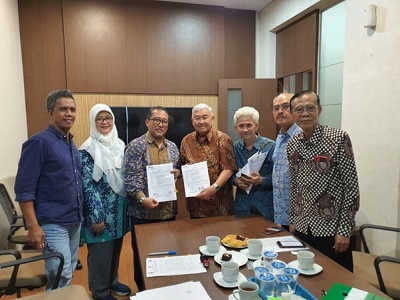Department of Forest Products IPB University and ISWA Cooperate in Wood Product Quality Testing and Student Field Work Practices

The Department of Forestry Products, Faculty of Forestry and Environment (Fahutan) IPB University established a strategic partnership with the Indonesian Sawmill and Woodworking Association (ISWA) for wood product quality testing activities for field work practice (PKL) for students. The signing of the cooperation agreement was done at IPB Dramaga Campus, some time ago.
Dr Naresworo Nugroho, Dean of Fahutan IPB University said, "The collaboration between the Forestry Department of IPB University and ISWA will strengthen collaboration between industry and universities and encourage educational growth based on the Freedom of Learning- Independece Campus (MBKM) programme."
Under this agreement, IPB University's Forestry Products Department will conduct quality testing and analysis of wood products from ISWA member industries using appropriate facilities, equipment and testing standards. This will provide an opportunity for ISWA to obtain objective test results that can be accounted for to potential customers accurately and efficiently.
Ir Suhariyanto, IPU, Asean Eng, Executive Director of ISWA hopes that this collaboration will be a pioneer pilot for ISWA to synergise with universities to encourage the regrowth of the woodworking industry in Indonesia. "It's time for universities to bring research results and innovations out of the 'drawer' and bring them to us, the business people," he said.
ISWA Presidium Chairman, Ir H M Wiradadi Soeprayogo, IPU, AseanEng revealed that many woodworking and processed wood industries have closed or are not operating because they are still fixated on the use of wood with the old concept. "This cooperation will be a stimulant for our members to open up to innovation and the use of wood that is currently developing. Old-school wood processing should be abandoned, start using engineered wood products. If not, we will be 'finished'," he added.
Dr Istie Sekartining Rahayu, Head of the Department of Forestry Products of IPB University added that this collaboration also opens up opportunities for the implementation of PKL for students of the Department of Forest Products of IPB University in ISWA member companies. With this, students will have the opportunity to experience the world of work and learn to apply their knowledge in the real world, while gaining insight into best practices in the timber industry.
"This field work practice will provide invaluable experience for IPB University students, preparing them to become a competent and competitive workforce in the timber industry," she said.
The parties present at the event also shared their views on the importance of this collaboration. Ir Tonny Hari Widiananto, MSc, IPU, ASEAN Eng, Chairman of the Forestry Engineering Vocational Board (BKTHut) revealed that the lack of wood utilisation for construction in Indonesia is partly due to the low introduction of wood in the field of architecture.
He further argued, "Architecture graduates may only get knowledge about wood as a construction material, only about 1-2 lecture meetings. They do not understand that innovations in improving the quality of wood and the durability of wood have been quite developed, especially in Fahutan IPB University."
For this reason, he said, universities and industry need to collaborate, producing professional and reliable forestry engineer graduates. Of course, this is to support the growth of an environmentally sound timber industry.
This collaboration marks a step forward in building a partnership between the Forest Products Department of IPB University and ISWA and encouraging mutually beneficial synergies in the field of wood product quality testing and student PKL. This collaboration between educational institutions and industry is expected to provide tangible benefits for improving the quality of wood products and developing a skilled workforce in the forestry sector. (*/Rz) (IAAS/RUM)



